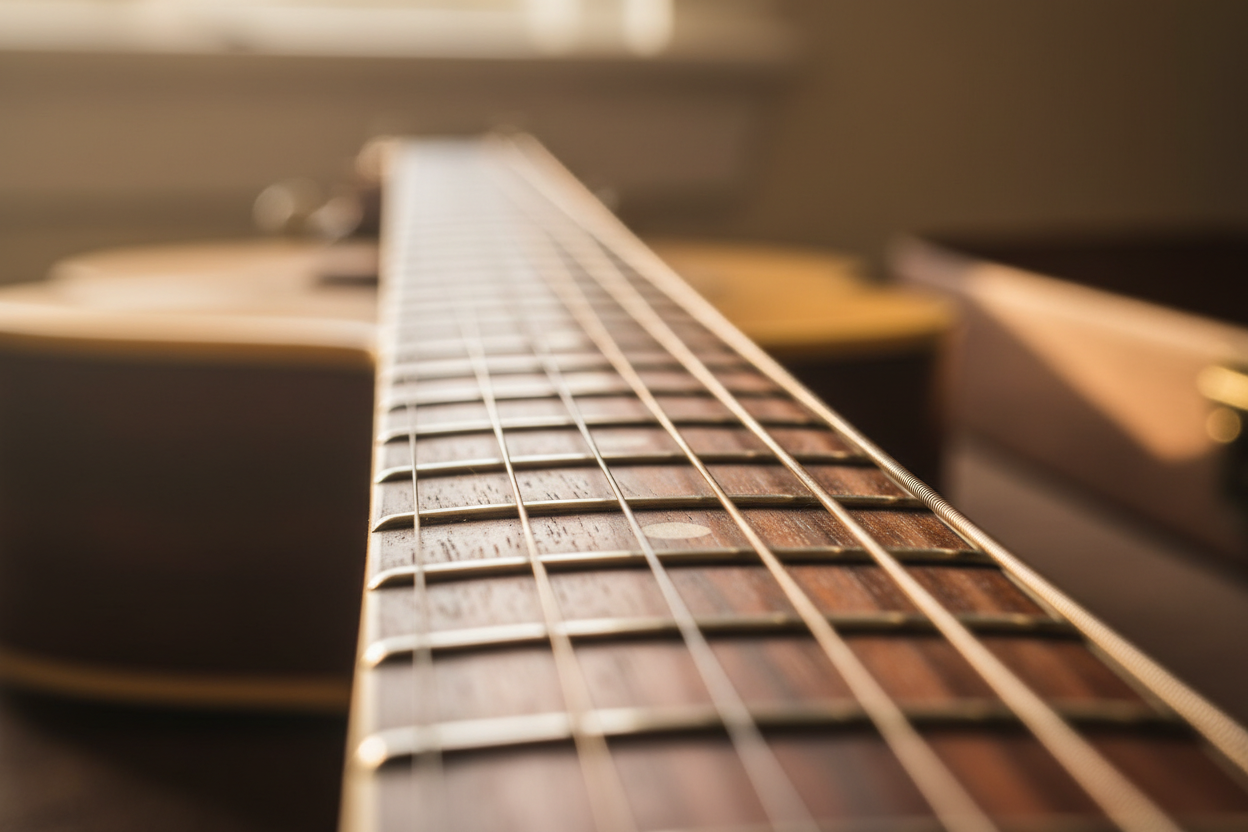Why do My Guitar Frets Buzz?
Many guitarists have a problem with buzzing guitar strings. For the most part, the buzzing is a sign that a guitar has a poor setup, but fret buzz can also be caused by poor technique, heavy strumming, or picking. Let's go over some of the most common causes of fret buzz.
The Guitar's Truss Rod Needs Adjusting
The lower fret register can buzz if your guitar neck doesn't have the proper neck relief adjustment. A guitar neck should be slightly bowed away from your strings. This slight dip in the neck ensures that the guitar string will clear the frets that follow your fretted notes.
If you have too much relief, it will cause fret buzz in the upper register of your neck. If the neck bows away from your strings too much, your strings will not clear the upper fret register adequately when playing mid-neck positions.
The Guitar Action is Too Low
Guitar action is the space between the fret and the string. A high action can make the guitar more difficult to play and cause intonation issues. Low action is desirable because of increased playability. But, if your action is too low, it will cause fret buzz. On electric guitars, a nice action would be 1.75 to 2 mm off the 12th fret of string 6 and 1.5 to 1.75 of the 12th fret of string one. This measurement seems to work well on most electric guitars I set up. If you go any lower, the fretwork better be perfect, and the upper frets should have some fall away either by it being milled into the neck or the frets being filed down a little lower so that they clear the guitar strings rotational pattern.
Frets Are Not Level
If your frets are not level, it will cause fret buzz or even dead notes. Sometimes the culprit is just a loose fret. Often a loose fret can be fixed by gently tapping it down with a hammer. But be careful if you try this yourself. If you tap too hard, you could accidentally change the form of the fret causing it to lift at the fret ends.
Sometimes a loose fret will have to be glued to stay in place. Gluing a fret tight requires some prep work to protect the fretboard to keep it from getting messy.
Other times, the uneven frets might be the result of poor installation. The guitar neck needs to have a slight relief in it when the frets are being leveled so that it is true to form once the strings are installed.
Your Guitar Neck is Warped or Twisted
If this is the case, you have problems, but it's not the end of the world for your guitar. Sometimes you can level frets in problem areas on the guitar neck to compensate for these types of irregularities. Raising your action will also help clean up the buzzing, but it could make your guitar more challenging to play. In severe cases, the fretboard will need to be planed flat.
You Have a Poor Technique When Fretting Notes
If you don't have your fingers in the proper position, it will cause fret buzz. Your strings will ring best when they are positioned just behind the fret. The notes still ring well if you are in the mid-position between 2 frets. Try as an experiment fretting the A note on string six at the 5th fret. Position your finger right behind the 5th fret and play your note. It should ring clearly if your guitar is set up well.
Now try positioning your finger so that it is right after the 4th fret, even touching the 4th fret, which some players will do when learning how to play the guitar. You'll notice that the A note will not ring out clearly.
So in practice, try to have your fingers positioned midpoint between frets, but preferably behind the frets when feasible.
You're Picking or Strumming Too Hard
If you have a heavy-handed attack when playing guitar, you will cause unintended fret buzz. You might want to raise your action a little to adjust for your playing style or use heavier gauge strings.
When a guitar gets set up, your tech is not plucking the strings very hard. It's more of a medium attack—just enough pressure for good volume and for the guitar string to ring nicely with good sustain. A heavier attack will cause the string to have a wider rotational pattern that will undoubtedly cause some buzzing. This doesn't always sound bad, though. You can hear some fret buzz in many recordings of some of the best guitarists ever recorded. The dynamics of some songs require more forceful picking techniques; it's OK if this causes a little buzz.
Not Enough Pressure When Fretting Notes
You will get fret buzz if you do have enough pressure on the guitar string when fretting notes. When practicing, be mindful of how much force it takes for the strings to ring clearly. After some time, muscle memory will kick in, and you will not have to give it any thought.
But, be careful not to apply too much pressure as it can cause your notes to go sharp. I see this sometimes happen with folks who are primarily acoustic players and pick up the electric guitar. They are used to squeezing the thicker strings of an acoustic guitar, but when they use that same amount of force when fretting notes on electric guitar, their chords sound out of key.
You're Lifting Your Finger Off the Note too Slowly
When playing scales, you need to lift your finger off the note fast enough so that it releases cleanly. If you lift off your note by decreasing pressure too slowly, there will be that split second that you are still fretting the note with inadequate pressure, which will result in fret buzz.
The Humidity Level Caused Your Fretboard to Swell
When the humidity level goes over 55%, it can cause swelling in the upper fretboard of acoustic guitars and archtops where the neck joins the body. The swelling will cause the frets to be too high and get in the path of a vibrating string.
Guitars perform best at 50% relative humidity. If humidity levels go over 60%, it can cause swelling and expansions that could seriously damage your guitar. Bracings and bridges can pop loose to give you a couple of examples. Use a dehumidifier where you store your guitar if your climate has high humidity.
Your Acoustic Guitar's Top has Dried Out
If the relative humidity levels drop below 40%, the wood that makes up your guitar will start to shrink. As a result, the soundboard will sink inward, lowering the guitar's action and cause fret buzz.
A dehydrated guitar can also result in a cracked top, bracings, bridges, and other guitar parts breaking loose. So make sure you keep your guitar humidified in dry climates for optimal performance and avoid any damage from dehydration.
Detuning Your Guitar Can Cause Fret Buzz
If your guitar was initially set up using standard tuning, you could likely have fret buzz issues if you detune it. Drop tunings are very popular, but if you plan on keeping your guitar tuned that way, you will need to get your guitar set up for your favorite tuning.
When you detune your guitar, there is less tension on the guitar neck. It will straighten out and possibly bow towards the strings. Your truss rod will need to be readjusted to give the guitar neck the proper relief.
You should also consider heavier strings if you drop your tuning. This is because light strings will not have enough tension when tuned lower. As a result, the vibration pattern will broaden and cause an unwanted buzz. Raising your action might also be necessary depending on your pick attack.
In Conclusion
Fret buzz is a common occurrence with guitars and is acceptable to a certain degree. However, guitars need to be set up for the playing style of the individual player to minimize it.
When should we take action to correct fret buzz?
- The buzzing can be heard through your amp
- The fret buzz continues after the initial pick attack
- The pitch stays the same the next fret or frets as you ascend the guitar's neck.
- The notes do not sustain well
- The frets buzz when applying light to medium attack
Just remember, it's normal for an instance of fret buzz on your initial pick attack. To what degree is dependent on how much pressure you use to pluck or strum your strings. If it bothers you, you'll need to adjust your technique or action to minimize occurrences.
We hope you found this information helpful. If you are experiencing fret buzz and are in need of a guitar setup, give us a shout so that we can be of service. If you attempt any setup procedures yourself, please research thoroughly before making any truss rod or bridge adjustments to avoid damaging your guitar. If you have any questions or concerns, comment below or feel free to contact us anytime. Happy playing! :D




